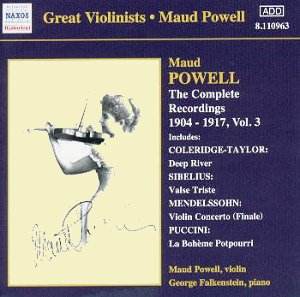As with the first two volumes of this Maud Powell series
from Naxos, both of which I’ve reviewed here [1]
[2],
the third is an engaging selection of repertoire spanning much of her
life in the recording studios. It includes one very pleasant surprise
in the form of a potpourri from La Bohème, which has never before
been issued and appears courtesy of the RCA Music Group. It’s the only
unpublished recording of Powell’s for which a metal master still remains
though hope springs eternal in the 78 collector’s heart and more may
yet turn up. As before let me register my accustomed caveat now – this
is a series that should have followed Powell’s recording career chronologically,
beginning with her 1904 sessions and ending with her last in 1917.
Still, that gripe aside – and I concede that it makes
better programming sense to mix and match – there is as ever much to
interest and beguile the listener. Powell was an assertive musician
and timidity was not her forte and so we have some splendid examples
of her buoyant musicianship as well as examples of performance practice
that will educate and intrigue. There are some mechanical sounding thumps
on the first track, the Tenaglia, and Powell is guilty of some fairly
gauche portamanti though her dynamics are sensitive and artful. Her
Leclair Tambourin is really fine though – splendidly animated and resilient,
a top class performance. All the references I’ve ever seen to the 1914
recording of Handel’s once ubiquitous "Largo" – she recorded
it twice – cite a string quartet in support; Rattay, Fruncillo, Levy
and Bourdon. This isn’t it. Howard Rattay made some Victors – indeed
as an obbligato player to Farrar -and Bourdon is well known to cello
collectors. But this recording features a rather stolid brass group
accompanying her (in the discography printed in Karen Shaffer’s Maud
Powell biography the accompaniment is given as string quartet plus tuba,
not as incredible as it might sound). Perhaps someone should have a
look at the Victor recording ledgers again.
Powell’s rather slow vibrato is shown up in Beethoven’s
Minuet, in the lower strings particularly where there is an endemic
lack of lyric vibrancy. The finale of the Mendelssohn Concerto however
is a stylish and neat one with a couple of unsightly bulges aside; it’s
not as impressive as Ysaye’s almost contemporaneous Columbia version
but Victor’s sides were longer and Powell plays more of it. Boisdeffre’s
inconsequential Au bord receives a charming performance; don’t be put
off by the initial scuffing as the sound quality improves. No recital
was complete without Dvorak’s Humoresque and Powell plays it with technical
adroitness though with something less than vibrance. In the lyric episodes
her rather dry tone tends to limit opulence and she has a tendency here
to rush passages to heighten contrast. She shows off her pizzicato in
Gilbert’s Marionettes, an atmospheric little genre scherzo and there
is some unusually emotive playing in Hubay’s Hejre Kati (spelt incorrectly
in the notes). This is in fact a splendid performance; nice finger position
changes, fine sense of elastic rhythm, sleek and vibrant playing, excellent
projection. It was a one-take performance as well. Her Zephyr is on
a slightly less exalted level, lacking the same sense of theatre. She
makes up for the relative lack of panache here in the following item,
Moszkowski’s Serenata, though her lack of vibrancy in the slower sections
is a distinct handicap. She must have had a liking for Neruda’s Slavonic
Cradle Song because she first recorded it in 1904, again in 1909 (one
take with the mute) and once more in 1916 again with Arthur Loesser
in 1916. We have here the middle recording – the piece itself is a mildly
spiced one, rather formulaic but sensitively shaped by Powell and especially
good in the higher positions. Indeed examples of her sensitive ear for
contour and phrasing are littered throughout this disc – the Saint-Saëns,
Massenet and Sibelius Musette are all examples. In Valse Triste though
more slowish vibrato disappoints but there is affecting delicacy as
well and we are also reminded of her propagandist work with regard to
Sibelius’ Violin Concerto; she gave the first American performance in
1906 and toured it doughtily and repeatedly. Florent Schmitt’s Chanson
à bercer is winningly done in this 1914 Victor (was this the
first Schmitt on disc?) whereas Wieniawski’s Kujawiak is forceful and
clean but not really opulent enough to be persuasive. The unissued Puccini
is very much of its time – the kind of thing the British violinist Mary
Law was so adept at doing on the Zonophone label, operatic paraphrases
and highlights. A tremendous survival and in fine aural shape as well.
The disc concludes with Coleridge-Taylor’s version of Deep River. She
premiered his Violin Concerto – dedicated to her – though she apparently
found it charming but lightweight. Powell was always a most impressive
player of spirituals and she does the work proud with some fine lower
string depth.
Once again the transfers don’t differ markedly from
those that Ward Marston prepared for the Maud Powell Foundation’s CDs
and cassettes of some years ago. The series maintains its excellence
in this latest release.
Jonathan Woolf



![]() Maud Powell (violin) with
variously
Maud Powell (violin) with
variously ![]() NAXOS 8.110963 [68.58]
NAXOS 8.110963 [68.58]